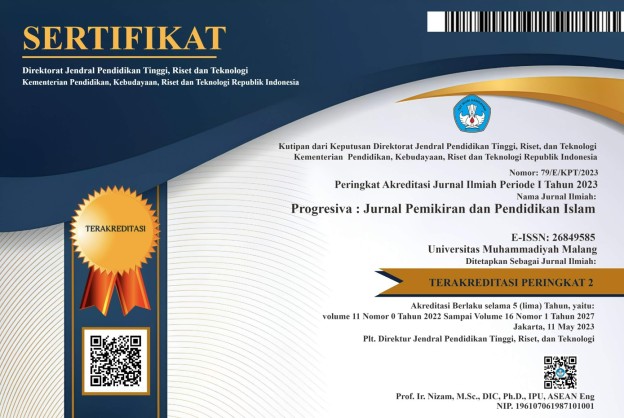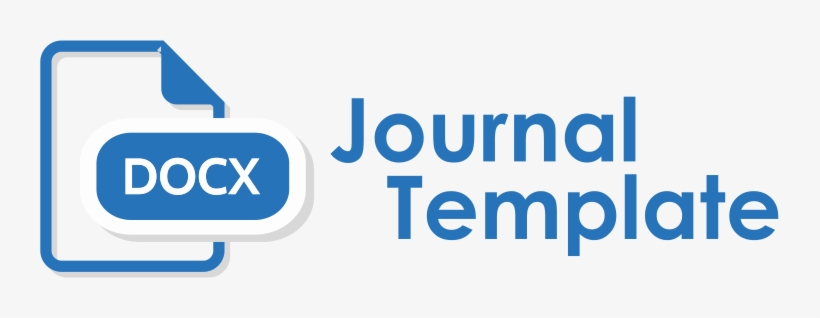The Rise of Muhammadiyah’s Islamic Da’wah in the Contemporary Era: Transformation to Online Trend and Responses to Islamic Moderation
DOI:
https://doi.org/10.22219/progresiva.v11i01.20889Abstract
This research explains about the rise of Muhammadiyah’s Islamic da’wah in the contemporary era. In particular, this study aims to describe the transformation of Muhammadiyah’s Islamic da’wah through social media and its response to Islamic moderation in Indonesia. The transformation of online da’wah was absolute, because it was based on the spread of ideology and narration of religious extremism that had been spreading on social media in the last two decades. This research used qualitative approach by strengthening the argumentation building on the research topic through descriptive analysis based on extracting data in the field. Data collection techniques were carried out through in-depth interviews and documentation from various Muhammadiyah online da’wah sites. This research found a new and very important thesis issue, Muhammadiyah experienced a positive trend in strengthening Islamic da’wah strategies on social media. The rise was marked by an increase in the number of new online da’wah portals affiliated with Muhammadiyah. The various da’wah sites seemed innovative and creative in content and professional from the management side, as well as voicing the narrative of Islamic moderation.
Downloads
References
APJII. (2022, tt th). Profil Internet Indonesia 2022. Jakarta: Asosiasi Pengguna Jasa Internet Indonesia. Retrieved from apjii.or.id: https://apjii.or.id/content/read/39/342/Hasil-Survei-Penetrasi-dan-Perilaku-Pengguna-Internet-Indonesia-2017
Aprilyawati, F. D., & Nurudin, N. (2022). Strategi Komunikasi Media Islam Alif.id dan IBTimes.id dalam Penyebaran Paham Moderasi. Islamic Communication Journal , 35-52.
Arifin, S. (2016). Islamic Religious Education and Radicalism in Indonesia: Strategy of De-radicalization through Strengthening the Living Values Education. Indonesian Journal of Islam and Muslim Society, 93-126.
Azra, A. (2020, November). uinjkt.ac.id. Retrieved from uinjkt.ac.id: https://www.uinjkt.ac.id/id/Muhammadiyah-dan-moderasi-beragama-perspektif-islam-berkemajuan//
Bachtiar, H. (2020). Dār al-‘Ahd wa al-Shahādah: Muhammadiyah’s Position and Thoughts on Negara Pancasila. Studia Islamica, 485-513.
Budiantoro, W. (2017). Dakwah di Era Digital. Jurnal Komunika, 263-281.
Burhani, A. N. (2016). Muhammadiyah Berkemajuan : Pergeseran dari Puritanisme ke Kosmopolitanisme. Bandung: PT. Mizan Pustaka.
Burhani, A. N. (2016). Muhammadiyah Berkemajuan: Pergeseran dari Puritanisme ke Kosmopolitanisme. Bandung: Mizan Pustaka.
Burhani, A. N. (2020). Muslim Televangelists in the Making: Conversion Narratives and the Construction of Religious Authority. The Muslim World, 154-175.
Dwinda, A. (2021, April). employers.glints.id. Retrieved from employers.glints.id: https://employers.glints.id/resources/mengenal-vuca-volatility-uncertainty-complexity-ambiguity/
Egi Sukma, V. (2020). Islam dalam Merespons Era Digital: Tantangan Menjaga Komunikasi Umat Beragama di Indonesia. SANGKEP: Jurnal Kajian Sosial Keagamaan, 185-208.
Fanani, S. (2021, October). Muhammadiyah's digital da’wah. (S. Huda, Interviewer)
Fathoni, N. (2021, November). Muhammadiyah digital da’wah. (S. Huda, Interviewer)
Goodwin, T. (2018). Digital Darwinism: Survival of the Fittest in the Age of the Business Disruption. London: Kogan Page Inspire.
Harold D, l., & Effendi, O. U. (2002). Dinamika Komunikasi . Bandung: Remaja Rosdakarya.
Hoffman, J. (2007). A Glosarium Teori Politik (Hardback). Edinburgh: Edinburgh University Press.
Huda, A. Z., Runturambi, A. J., & Syauqillah, m. (2021). Social Media as An Incubator of Youth Terrorism In Indonesia: Hybrid Threat and Warfare. Journal Indo Islamica, 21-40.
Huda, S. (2017). The Clash of Ideologi Muhammadiyah: Ideologi Moderat versus Radikal. Yogyakarta: Semesta Ilmu.
Huda, S. (2021). Dakwah Digital Muhammadiyah. Yogyakarta: Majelis Diktilitbang PP Muhammadiyah.
Huda, S. (2022). Dakwah Digital Muhammadiyah (Pola Baru Dakwah Era Disrupsi). Yogyakarta: Samudra Biru.
Ibtimes.id. (n.d.). ibtimes.id. Retrieved from ibtimes.id: https://ibtimes.id/tentang-kami/
Irfan H, M., Darojat J. K, A., & Ali, M. (2021). The understanding of Islamic Moderation (Wasatiyyah al-Islam) and the Hadiths on Inter-Religious Relations in the Javanese Pesantrens. Indonesian Journal of Islam and Muslim Society, 351-376.
Juditha, C. (2020). Utilization of Information Communication Technology Towards Social Changes In Village Communities: Study in Suka Datang Village, Curup Utara, Rejang Lebong, Bengkulu . Jurnal Penelitian Komunikasi dan Opini Publik, 16-30.
Kahmad, D. (2021). Merespon Era Informasi Dengan Gerakan Dakwah Digital. Surabaya: Majalah MATAN PWM Jawa Timur.
KBBI. (n.d.). KBBI. Retrieved from KBBI: https://kbbi.kemdikbud.go.id
Khoirudin, A. (2021, November). Muhammadiyah Da’wah Digital. (S. Huda, Interviewer)
Khoirudin, A. (2022). Dakwah Digital Muhammadiyah: Perlukah Cara Baru? MATAN Magazine, 23.
Lim, M. (2017). Freedom to hate: social media, algorithmic enclaves, and the rise of tribal nationalism in Indonesia. Critical Asian Studies, 411-427.
Luwarso, L. (2007, November). dewanpers.or.id. Retrieved from dewanpers.or.id: https://dewanpers.or.ir/publikasi/opini_detail/41/Dosa_Media//
Maulana, D. (2018). Situs-situs Islam: kontestasi narasi radikal dan moderat. Jakarta: PPIM UIN Syarif Hidayatullah Jakarta.
McQuail, D. (2002). Teori Komunikasi Massa Suatu Pengantar. Jakarta: Penerbit Erlangga.
Muhajir, N. (2020). Metodologi Penelitian Kualitatif. Cetakan I. Yogyakarta: Rosdakarya.
Muhammadiyah, P. (2015). Tanfidz Keputusan Muktamar Muhammadiyah Ke-47. Jakarta: PP. Muhammadiyah.
Muhammadiyah, P. (2015). uad.ac.id. Retrieved from uad.ac.id: https://uad.ac.id/id/muhammadiyah-membangun-masyarakat-islam-yang-sebenarnya/
Muhammadiyah, P. P. (2015). Tanfidz Keputusan Muktamar Muhammadiyah ke-47. Makassar: PP. Muhammadiyah.
Muthohirin, N. (2015). Radikalisme Islam dan Pergerakannya di Media Sosial. Afkaruna: Indonesian Interdisciplinary Journal of Islamic Studies, 240-259.
Muthohirin, N. (2021). Da’wah in Social Media: TheViews of Ustad Hanan Attaki and Felix Siauw to The Hijrah Phenomenon. Afkaruna: Indonesian Interdisciplinary Journal of Islamic Studies, 249-270.
Nashir, H. (2019). Dakwah Digital dan Pusat Informasi Muhammadiyah Berkemajuan. Surabaya: Majalah MATAN.
Nashir, H. (2021, September). Suara Muhammadiyah. Retrieved from Suara Muhammadiyah: https://suaramuhammadiyah.id/2021/08/26/mengintensifkan-dakwah-digital/
Nidhom, A. (2021, October). Digital Da’wahh Muhammadiyah. (S. Huda, Interviewer)
Prawoto, S. (2021, October). The Transformation of Muhammadiyah Digital Da’wah. (S. Huda, Interviewer)
Qodir, Z. (2017). Radikalisme, Muhammadiyah dan Populisme Islam. Ma'arif, 37-55.
Sardar, Z. (1991). Tantangan Dunia Islam Abad 21. Bandung: Mizan.
Setiawan, B. (2021, November). investor.id. Retrieved from investor.id: https://investor.id/opinion/182959/dakwah-pencerahan-era-digital
Setowara, S. (2017, November Wednesday). Geotimes.id. Retrieved from Geotimes.id: https://geotimes.id/kolom/muhammadiyah-milenial/
Sulfikar, A. (2018). Swa-Radikalisasi Melalui Media Sosial di Indonesia. Jurnalisa : Jurnal Jurusan Jurnalistik, 76-90.
Yumitro, G., E. K., D., A. Abdelsalam, E., & Farhana M. S, S. (2022). The influences of social media toward the development of terrorism in Indonesia. Jurnal Studi Komunikasi, 16-31.
Downloads
Published
How to Cite
Issue
Section
License
Copyright (c) 2022 Sholihul Huda, Mohammad Maulana Mas’udi, Nafik Muthohirin

This work is licensed under a Creative Commons Attribution-ShareAlike 4.0 International License.


















